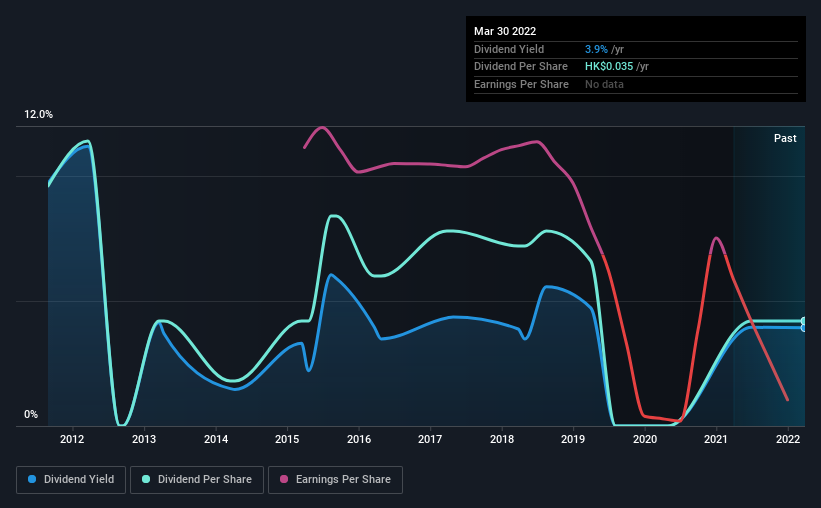- Hong Kong
- /
- Trade Distributors
- /
- SEHK:387
Leeport (Holdings)'s (HKG:387) Shareholders Will Receive A Smaller Dividend Than Last Year

Leeport (Holdings) Limited (HKG:387) has announced it will be reducing its dividend payable on the 15th of July to HK$0.025. Despite the cut, the dividend yield of 5.6% will still be comparable to other companies in the industry.
Check out our latest analysis for Leeport (Holdings)
Leeport (Holdings)'s Distributions May Be Difficult To Sustain
We aren't too impressed by dividend yields unless they can be sustained over time. Even though Leeport (Holdings) isn't generating a profit, it is generating healthy free cash flows that easily cover the dividend. We generally think that cash flow is more important than accounting measures of profit, so we are fairly comfortable with the dividend at this level.
Over the next year, EPS might fall by 57.7% based on recent performance. While this means that the company will be unprofitable, we generally believe cash flows are more important, and the current cash payout ratio is quite healthy, which gives us comfort.

Dividend Volatility
Although the company has a long dividend history, it has been cut at least once in the last 10 years. The dividend has gone from HK$0.08 in 2012 to the most recent annual payment of HK$0.035. Doing the maths, this is a decline of about 7.9% per year. A company that decreases its dividend over time generally isn't what we are looking for.
The Dividend Has Limited Growth Potential
Dividends have been going in the wrong direction, so we definitely want to see a different trend in the earnings per share. Over the past five years, it looks as though Leeport (Holdings)'s EPS has declined at around 58% a year. A sharp decline in earnings per share is not great from from a dividend perspective. Even conservative payout ratios can come under pressure if earnings fall far enough.
The Dividend Could Prove To Be Unreliable
In summary, dividends being cut isn't ideal, however it can bring the payment into a more sustainable range. The company is generating plenty of cash, which could maintain the dividend for a while, but the track record hasn't been great. We don't think Leeport (Holdings) is a great stock to add to your portfolio if income is your focus.
Companies possessing a stable dividend policy will likely enjoy greater investor interest than those suffering from a more inconsistent approach. Still, investors need to consider a host of other factors, apart from dividend payments, when analysing a company. For example, we've identified 3 warning signs for Leeport (Holdings) (1 doesn't sit too well with us!) that you should be aware of before investing. Looking for more high-yielding dividend ideas? Try our collection of strong dividend payers.
If you're looking to trade Leeport (Holdings), open an account with the lowest-cost platform trusted by professionals, Interactive Brokers.
With clients in over 200 countries and territories, and access to 160 markets, IBKR lets you trade stocks, options, futures, forex, bonds and funds from a single integrated account.
Enjoy no hidden fees, no account minimums, and FX conversion rates as low as 0.03%, far better than what most brokers offer.
Sponsored ContentNew: AI Stock Screener & Alerts
Our new AI Stock Screener scans the market every day to uncover opportunities.
• Dividend Powerhouses (3%+ Yield)
• Undervalued Small Caps with Insider Buying
• High growth Tech and AI Companies
Or build your own from over 50 metrics.
Have feedback on this article? Concerned about the content? Get in touch with us directly. Alternatively, email editorial-team (at) simplywallst.com.
This article by Simply Wall St is general in nature. We provide commentary based on historical data and analyst forecasts only using an unbiased methodology and our articles are not intended to be financial advice. It does not constitute a recommendation to buy or sell any stock, and does not take account of your objectives, or your financial situation. We aim to bring you long-term focused analysis driven by fundamental data. Note that our analysis may not factor in the latest price-sensitive company announcements or qualitative material. Simply Wall St has no position in any stocks mentioned.
About SEHK:387
Leeport (Holdings)
An investment holding company, engages in the trading of metalworking machinery, measuring instruments, cutting tools, and electronic equipment in the People’s Republic of China, Hong Kong, and internationally.
Flawless balance sheet established dividend payer.
Market Insights
Community Narratives




